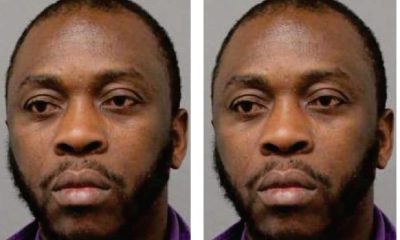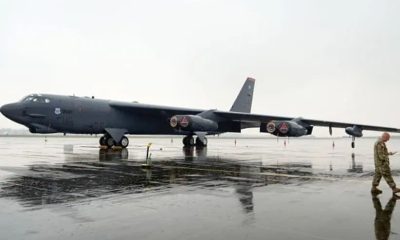International
Kevin McCarthy voted out as US House speaker
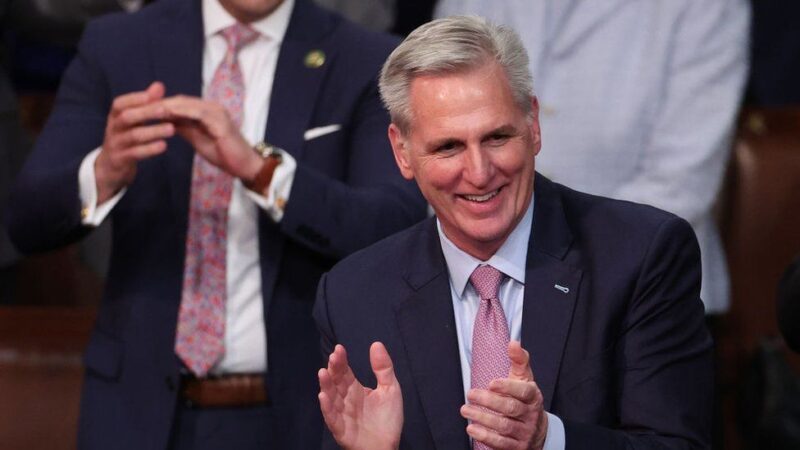
Kevin McCarthy voted out as US House speaker
Speaker of the United States House of Representatives, Kevin McCarthy, was fired on Tuesday in a violent takeover by far-right Republican legislators enraged by his collaboration with Democrats.
The House backed a motion “to vacate the office of the speaker” with a 216-210 majority, laying the groundwork for a historic race to replace McCarthy a year before the presidential election.
McCarthy felled by his own side
Republican Kevin McCarthy rode the tiger of far-right US politics led by Donald Trump to achieve his dream of becoming House speaker early this year. Then on Tuesday, the tiger turned and ate him up.
The 55th speaker of the House of Representatives was booted out in a shock vote brought by rebels in his own party who have seethed in the nine months since McCarthy narrowly quelled their attempts to block him and managed to claim the most powerful job in Congress.
No other speaker a position second in line from the presidency in the federal hierarchy has been ousted in US history.
It was an undignified end—for now, at least—to an unstable, unauthoritative tenure by a lawmaker who made his mark as a so-called conservative “Young Gun,” only to get battered by his party’s shifting political currents.
Like many in Congress, he had berated Trump after the January 6, 2021, US Capitol riot. But the ambitious lawmaker sensed the winds changing and quickly reversed himself, making a public trip down to Florida to make peace with Trump, thereby securing crucial support for his speakership ambitions.
READ ALSO:
- Manhood disappearance: Police arraign 14 suspects for false alarm in Abuja
-
Eberechi Eze: Crystal Palace midfielder out for six weeks with hamstring injury
-
Oshiomhole founded Labour Party, we have no regrets supporting Peter Obi – Ajaero
Once McCarthy, 58, got what he wanted, though, he faced an uncomfortable reality: his grip on power would from then on be at the whim of his party’s burn-down-the-house hardliners.
Compromise kills
In May, he strode into a tense standoff with Democratic President Joe Biden over authorizing an extension of the national debt limit.
He struck an 11th-hour deal to avert a catastrophic US debt default, and while he hailed it as a victory for conservatives and good governance, he faced backlash from hardliners who said he had made too many concessions on spending cuts.
His limited engagement with Democrats was again the subject of the far-right’s ire last week when he used votes from the rival party to stave off a government shutdown.
The move defied hardliners—and Trump—who advocated harsh tactics in pursuit of forcing massive spending cuts and bringing down the country’s $31 trillion-plus debt burden.
Haunted from the start
McCarthy has described himself as an “optimist,” but there has been no placating the uncompromising right-wing of the Republican Party that flourished under Trump and never went away.
Simply to secure the speakership in January, it took him a record 15 rounds of voting to win, and he finally got over the line only after making concessions to a bloc of around 20 far-right Republicans.
READ ALSO:
-
Why I killed ex-President of Customary Court of Appeal — Nephew
-
UCL: Man United suffer stunning defeat to Galatasaray at Old Trafford
-
Catholic Church could bless same-sex marriages – Pope
Analysts at the time immediately predicted this would come back to haunt McCarthy by putting the hardliners in the driving seat.
One of those concessions was a rule change that made it possible for just one disgruntled member to call a vote for a new speaker of the House, effectively dangling a sword over McCarthy.
Backbencher Matt Gaetz, a Trump loyalist and emerging face of the far-right, seized on that change and filed the so-called motion to vacate the chair, leading to McCarthy’s ouster on Tuesday.
Networker
The speaker wields huge influence in Washington by presiding over House business and is second in line to the presidency after the vice president.
Nothing prevents McCarthy from running for speaker again. But the question is: can his party overcome its internal feuds and hand him back the gavel, or will they turn to new blood?
McCarthy, who represents the conservative enclave of Bakersfield in liberal California, has been in politics for most of his adult life as a state legislator and US lawmaker in Washington.
McCarthy, the son of a firefighter and grandson of a cattle rancher, grew up in a working-class household.
He married his high school sweetheart, and the couple still lives in the first house they bought, where they raised two children.
McCarthy, first elected to Congress in 2006, has no major legislative achievements to his name and has never chaired a House committee, unlike each of the last three speakers.
However, the silver-haired, impeccably dressed lawmaker is a consummate networker, admired for his prolific fundraising and his people management.
Kevin McCarthy voted out as US House speaker
(AFP)
International
Syria not threat to world, rebel leader al-Sharaa tells BBC
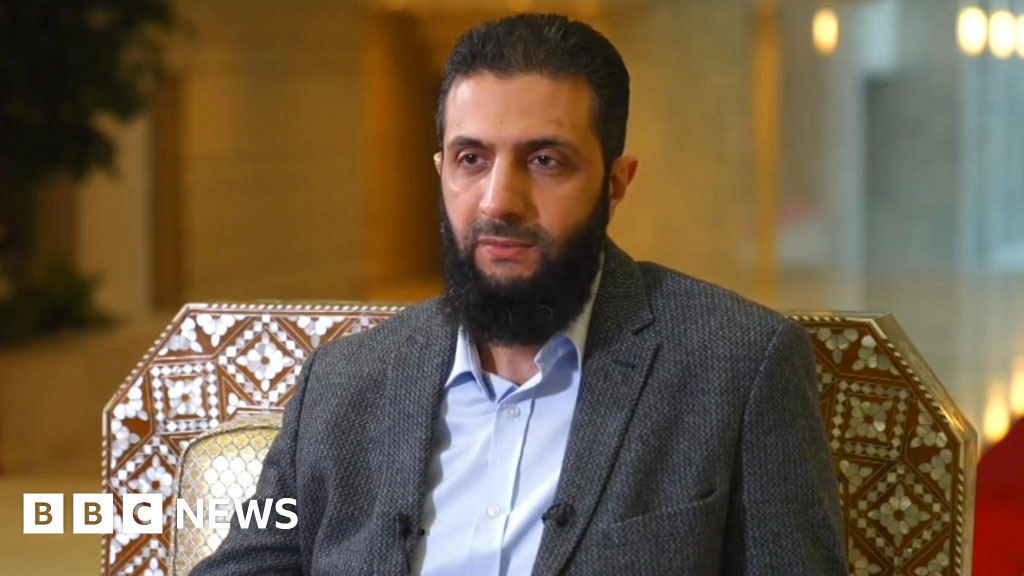
Syria not threat to world, rebel leader al-Sharaa tells BBC
The de facto leader of Syria, Ahmed al-Sharaa, has said the country is exhausted by war and is not a threat to its neighbours or to the West.
In an interview with the BBC in Damascus, he called for sanctions on Syria to be lifted.
“Now, after all that has happened, sanctions must be lifted because they were targeted at the old regime. The victim and the oppressor should not be treated in the same way,” he said.
Sharaa led the lightning offensive that toppled Bashar al-Assad’s regime less than two weeks ago. He is the leader of the Hayat Tahrir al-Sham (HTS), the dominant group in the rebel alliance, and was previously known by his nom de guerre of Abu Mohammed al-Jolani.
He said HTS should be de-listed as a terrorist organisation. It is designated as one by the UN, US, EU and UK, among many others, as it started as a splinter group of al-Qaeda, which it broke away from in 2016.
Sharaa said HTS was not a terrorist group.
They did not target civilians or civilian areas, he said. In fact, they considered themselves to be victim of the crimes of the Assad regime.
He denied that he wanted to turn Syria into a version of Afghanistan.
READ ALSO:
- Tinubu’s 2025 budget will increase poverty, worsen economy – PDP
- Real Madrid outclass Pachuca to win FIFA Intercontinental Cup
- Israel hits ports, energy sites in Yemen after missile intercepted
Sharaa said the countries were very different, with different traditions. Afghanistan was a tribal society. In Syria, he said, there was a different mindset.
He said he believed in education for women.
“We’ve had universities in Idlib for more than eight years,” Sharaa said, referring to Syria’s north-western province that has been held by rebels since 2011.
“I think the percentage of women in universities is more than 60%.”
And when asked whether the consumption of alcohol would be allowed, Sharaa said: “There are many things I just don’t have the right to talk about because they are legal issues.”
He added that there would be a “Syrian committee of legal experts to write a constitution. They will decide. And any ruler or president will have to follow the law”.
Sharaa was relaxed throughout the interview, wearing civilian clothes, and tried to offer reassurance to all those who believe his group has not broken with its extremist past.
Many Syrians do not believe him.
The actions of Syria’s new rulers in the next few months will indicate the kind of country they want Syria to be – and the way they want to rule it.
Syria not threat to world, rebel leader al-Sharaa tells BBC
BBC
International
Israel hits ports, energy sites in Yemen after missile intercepted
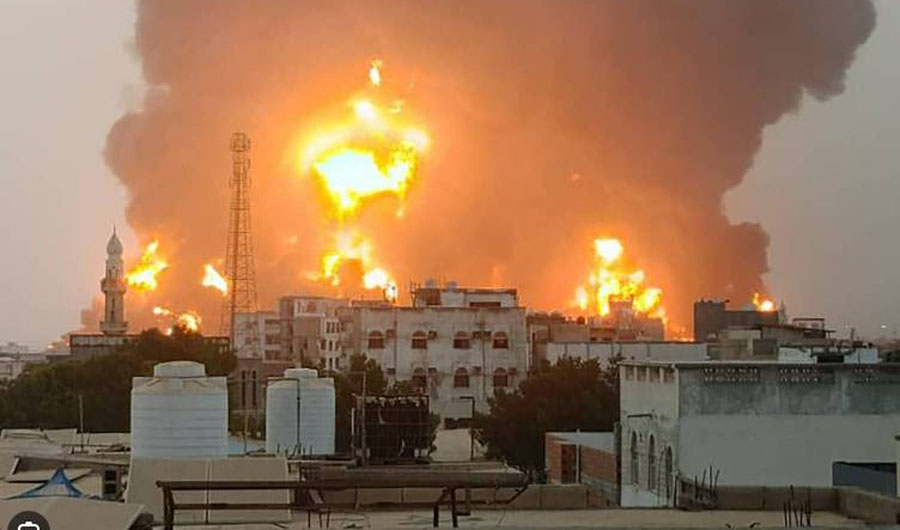
Israel hits ports, energy sites in Yemen after missile intercepted
JERUSALEM: Israel said Thursday it struck ports and energy infrastructure it alleges are used by Houthi militants, after intercepting a missile fired by the group.
Israel’s military said it “conducted precise strikes on Houthi military targets in Yemen — including ports and energy infrastructure in Sanaa, which the Houthis have been using in ways that effectively contributed to their military actions.”
The announcement came shortly after Israel said it had intercepted a missile fired from Yemen.
Al-Masira, a media channel belonging to the Houthis, said a series of “aggressive raids” were launched in the Yemeni capital of Sanaa and the port city of Hodeidah.
It reported raids that “targeted two central power plants” in Yemen’s capital Sanaa, while in Hodeidah it said “the enemy launched four aggressive raids targeting the port… and two raids targeting” an oil facility.
The strikes were the second time this week that Israel’s military has intercepted a missile from Yemen.
On Monday, the Houthis claimed a missile launch they said was aimed at “a military target of the Israeli enemy in the occupied area of Yaffa” — a reference to Israel’s Tel Aviv area.
READ ALSO:
- Gaza mediators intensify ceasefire efforts, Israeli strikes kill 20 people
- PDP expels South-East national vice chairperson over anti-party activities
- Your information on $1bn investment misleading, Dangote Refinery replies NNPCL
Also Monday, an Israeli navy missile boat intercepted a drone in the Mediterranean after it was launched from Yemen, the military said.
The Houthi militants have said they are acting in solidarity with Palestinians and pledged Monday to continue operations “until the aggression on Gaza stops and the siege is lifted.”
On December 9, a drone claimed by Houthis exploded on the top floor of a residential building in the central Israel city of Yavne, causing no casualties.
In July, a Houthi drone attack in Tel Aviv killed an Israeli civilian, prompting retaliatory strikes on the Yemeni port of Hodeidah.
The Houthis have also regularly targeted shipping in the Red Sea and the Gulf of Aden, leading to retaliatory strikes on Houthi targets by United States and sometimes British forces.
Israeli military spokesman Daniel Hagari said the group had become a “global threat,” pointing to Iran’s support for the militants.
“We will continue to act against anyone, anyone in the Middle East, that threatens the state of Israel,” he said.
Israel hits ports, energy sites in Yemen after missile intercepted
International
Gaza mediators intensify ceasefire efforts, Israeli strikes kill 20 people
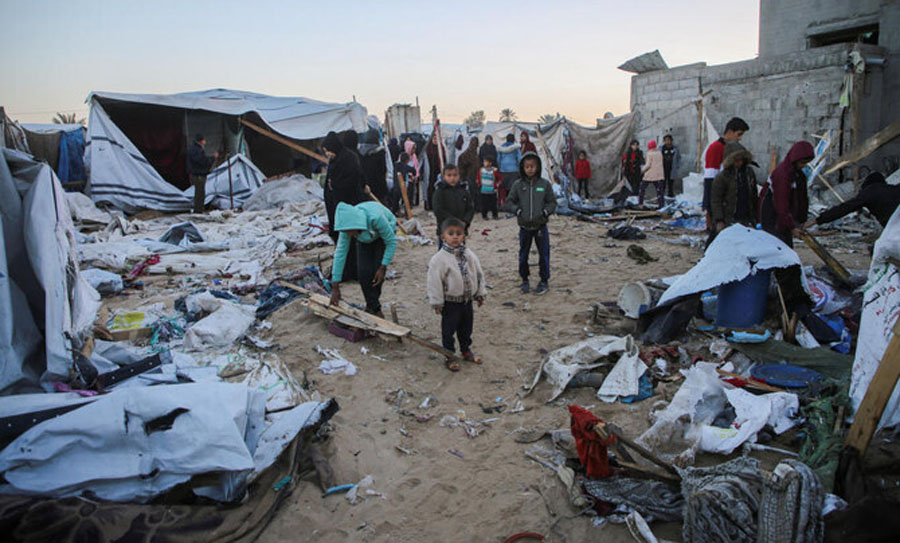
Gaza mediators intensify ceasefire efforts, Israeli strikes kill 20 people
CAIRO: The United States, joined by Arab mediators, sought on Wednesday to conclude an agreement between Israel and Hamas to halt the 14-month-old war in the Gaza Strip where medics said Israeli strikes killed at least 20 Palestinians overnight.
A Palestinian official close to the negotiations said on Wednesday that mediators had narrowed gaps on most of the agreement’s clauses. He said Israel had introduced conditions which Hamas rejected but would not elaborate.
On Tuesday, sources close to the talks in Cairo, the Egyptian capital, said an agreement could be signed in coming days on a ceasefire and a release of hostages held in Gaza in return for Palestinian prisoners held by Israel.
Medics said an Israeli airstrike killed at least 10 people in a house in the northern town of Beit Lahiya while six were killed in separate airstrikes in Gaza City, Nuseirat camp in central areas, and Rafah near the border with Egypt.
In Beit Hanoun in the northern Gaza Strip, medics said four people were killed in an airstrike on a house. There was no immediate comment from the Israeli military spokesman.
Israeli forces have operated in the towns of Beit Hanoun and Beit Lahiya as well as the nearby Jabalia camp since October, in a campaign the military said aimed to prevent Hamas militants from regrouping.
Palestinians accuse Israel of carrying out acts of “ethnic cleansing” to depopulate the northern edge of the enclave to create a buffer zone. Israel denies it.
READ ALSO:
- PDP expels South-East national vice chairperson over anti-party activities
- Your information on $1bn investment misleading, Dangote Refinery replies NNPCL
- Many die at Ibadan children’s Christmas party stampede, organisers arrested
Hamas does not disclose its casualties, and the Palestinian health ministry does not distinguish in its daily death toll between combatants and non-combatants.
On Wednesday, the Israeli military said it struck a number of Hamas militants planning an imminent attack against Israeli forces operating in Jabalia.
Later on Wednesday, Muhammad Saleh, director of Al-Awda Hospital in Jabalia, said Israeli shelling in the vicinity damaged the facility, wounding seven medics and one patient inside the hospital.
The Israeli military had no immediate comment.
In the Central Gaza camp of Bureij, Palestinian families began leaving some districts after the army posted new evacuation orders on X and in written and audio messages to mobile phones of some of the population there, citing new firing of rockets by Palestinian militants from the area.
CEASEFIRE GAINS MOMENTUM
The US administration, joined by mediators from Egypt and Qatar, has made intensive efforts in recent days to advance the talks before President Joe Biden leaves office next month.
In Jerusalem, Israeli President Isaac Herzog met Adam Boehler, US President-elect Donald Trump’s designated envoy for hostage affairs. Trump has threatened that “all hell is going to break out” if Hamas does not release its hostages by Jan. 20, the day Trump returns to the White House.
CIA Director William Burns was due in Doha on Wednesday for talks with Qatari Prime Minister Sheikh Mohammed bin Abdulrahman Al-Thani on bridging remaining gaps between Israel and Hamas, other knowledgeable sources said. The CIA declined to comment.
Israeli negotiators were in Doha on Monday looking to bridge gaps between Israel and Hamas on a deal Biden outlined in May.
There have been repeated rounds of talks over the past year, all of which have failed, with Israel insisting on retaining a military presence in Gaza and Hamas refusing to release hostages until the troops pulled out.
The war in Gaza, triggered by a Hamas-led attack on communities in southern Israel that killed some 1,200 people and saw more than 250 abducted as hostages, has sent shockwaves across the Middle East and left Israel isolated internationally.
Israel’s campaign has killed more than 45,000 Palestinians, displaced most of the 2.3 million population and reduced much of the coastal enclave to ruins.
Gaza mediators intensify ceasefire efforts, Israeli strikes kill 20 people
ARAB NEWS
-

 Railway1 day ago
Railway1 day agoLagos Rail Mass Transit part of FG free train ride – NRC
-

 metro10 hours ago
metro10 hours agoWhy we displayed ‘Jesus Christ is not God’ banner at Lekki mosque -Imam
-

 metro2 days ago
metro2 days agoCourt stops customs from seizing imported rice in open market
-

 metro3 days ago
metro3 days agoIbadan stampede: Tinubu orders probe as death toll hits 40
-

 metro2 days ago
metro2 days agoIbadan stampede: Ooni reacts after arrest of ex-wife
-

 metro2 days ago
metro2 days agoAfe Babalola: Court grants Dele Farotimi bail, barred from media interviews
-

 metro1 day ago
metro1 day agoNIMC warns against extortion, reaffirms free NIN enrollment
-

 News3 days ago
News3 days agoAdebayo Ogunlesi, 2 other Nigerians make Forbes 50 wealthiest Black Americans list 2024







